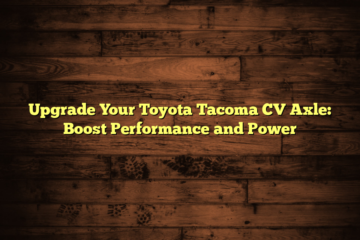What Does Ford Say About Catch Cans?
Ford’s stance on the use of catch cans, devices designed to trap excess oil vapor in PCV (Positive Crankcase Ventilation) systems before it can re-enter the engine’s intake, varies depending on the context and the specific engine model in question. Generally, automakers, including Ford, design their engines and emissions systems to meet strict regulations and performance standards without the need for aftermarket modifications like catch cans.
However, Ford may provide specific guidance or warnings about the use of such devices in certain cases, particularly concerning warranty considerations and potential impacts on engine performance or emissions compliance.
For a more in-depth exploration, let’s dive into the topic further.
Introduction
Catch cans have become a popular aftermarket modification among car enthusiasts aiming to improve engine performance and longevity. By capturing oil vapor and preventing it from being re-ingested into the engine, catch cans can theoretically reduce carbon buildup on intake valves and pistons, which is especially beneficial for direct injection engines. However, the effectiveness and necessity of catch cans can vary, and automakers like Ford have their own perspectives on the use of these devices.
Key Takeaways:
- Ford’s Official Position: Ford’s official stance on catch cans may not be universally stated, but typically, automakers recommend following factory specifications and caution against unauthorized modifications.
- Warranty Concerns: Installing an aftermarket catch can could potentially void your vehicle’s warranty if Ford determines that the modification led to a related engine issue.
- Engine Design Considerations: Modern Ford engines are designed with advanced PCV systems that often include factory-engineered solutions to manage oil vapor effectively.
- Potential Benefits: Catch cans can offer benefits, such as reduced carbon buildup, which is particularly advantageous in direct injection engines.
- Varied Necessity: The necessity of a catch can can depend on the specific engine model, driving conditions, and performance requirements.
- Compliance Issues: There may be emissions and regulatory compliance considerations to keep in mind when modifying your vehicle with a catch can.
Understanding Catch Cans
What Are Catch Cans?
Catch cans are aftermarket devices installed in the PCV system between the crankcase and the intake manifold. Their primary function is to condense and capture oil vapor and other contaminants before they can be re-ingested into the engine.
How Catch Cans Work
By cooling the oil vapor within the can, it condenses into liquid form, separating it from the air. This liquid is then typically drained manually from the catch can, preventing it from coating internal engine components.
The Importance of Oil Vapor Management
Managing oil vapor is crucial for maintaining engine efficiency and longevity. Excessive oil vapor in the intake system can lead to carbon buildup, potentially harming engine performance and emissions.
Ford’s Perspective on Catch Cans
While specific directives from Ford regarding catch cans may vary, several considerations are generally applicable.
Warranty Implications
Ford, like most automakers, may void the warranty for engine-related issues if they determine that an aftermarket catch can contributed to the problem.
Engine Design and Performance
Ford engineers its vehicles to meet performance and emissions standards without needing aftermarket modifications. The company might argue that the addition of a catch can is unnecessary and could even be detrimental in some cases.
Emissions Compliance
Ford must ensure that its vehicles comply with various emissions regulations. Unauthorized modifications like catch cans could potentially affect this compliance.
When Might Catch Cans Be Beneficial?
High-Performance and Racing Applications
In high-performance scenarios or racing, where engines are pushed beyond their standard operating conditions, catch cans might offer more significant benefits.
Older Engine Models
Older engines, especially those without the latest PCV technology, might see more substantial benefits from the addition of a catch can.
Specific Driving Conditions
Vehicles frequently operated in extreme conditions, such as heavy towing or in environments with significant temperature fluctuations, might benefit from a catch can to manage excessive oil vapor more effectively.
Conclusion
Ford’s stance on catch cans is nuanced and largely dependent on warranty, engine design, and regulatory considerations. While there may be scenarios where a catch can provides benefits, Ford vehicles are engineered to high standards that typically do not require such modifications. Vehicle owners should weigh the potential advantages against the risks of warranty voidance and compliance issues.
FAQ
Q: Can installing a catch can void my Ford warranty?
A: Potentially, yes. If Ford determines that a catch can contributed to an engine issue, it could void the warranty for that part of the vehicle.
Q: Are catch cans more beneficial for certain types of engines?
A: Yes, direct injection engines, which are more prone to carbon buildup due to the lack of fuel washing over the intake valves, can potentially benefit more from the use of catch cans.
Q: Do all Ford vehicles benefit from a catch can?
A: Not necessarily. The necessity and benefits of a catch can vary based on the specific engine, its design, and operating conditions.
Q: Could a catch can improve my vehicle’s performance?
A: While a catch can may help reduce carbon buildup, any noticeable improvement in performance would likely depend on the engine’s condition and design.
Q: Are there any downsides to installing a catch can on a Ford vehicle?
A: Besides potential warranty issues, improper installation or maintenance of a catch can could lead to other engine problems, such as oil starvation or incorrect PCV system functioning.




